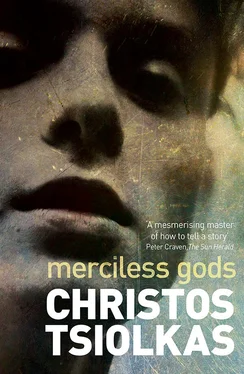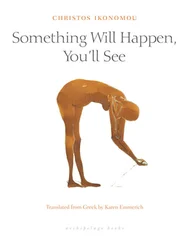Her lip curled, her face fell and he thought for a moment she was about to cry. ‘You bastard,’ she said up close to him, ‘when we do have kids, you dare say one racist thing to them, just one, and I swear I’ll leave you and take them away from you.’ She was thumping his chest, hard.
Next to them, a young woman giggled and whispered something to her boyfriend.
Bill took hold of Trina’s hands. ‘I promise,’ he repeated, frantically, earnestly, like a schoolboy pledging a vow on his mother’s life. ‘I promise, I promise.’
He had never been so desperate to assure her — and himself — of anything.
When they got back to their room, they found that the maid had scattered a handful of mints on the pillow where they had left the tip.
MY MOTHER IS BEST KNOWN FOR giving blowjobs to Pete Best and Paul McCartney in the toilets of the Star-Club in Hamburg one night in the early sixties. She said that Best’s penis was thicker, the bigger one, but that McCartney’s was the more beautiful. ‘Paul’s cock was elegant ,’ she liked to say. I know too that she had spat both men’s semen into a tissue, and that neither man had looked at the other while she took turns servicing them. Afterwards, she had shared a cigarette with Paul.
There is no exact date for when the above incident took place but we do know that The Beatles were performing in Germany from 1960 to the end of 1962. The musicians would have not yet been twenty; my mother, born towards the end of the war, would have been even younger.
My grandmother was a widow when she gave birth to my mother, having lost her husband in the battle for the Dukla Pass. Even on her deathbed my grandmother refused to name my mother’s father, preferring as she did the entire time I’d grown up in her house to remain silent about the war years and those following.
I know that much of my mother’s bitterness about her own mother arose from the obduracy of this denial. My mother saw it, as did many of her generation, as an unwillingness to face the past, as a denial that went beyond the personal and embodied the collective stink of German history. But I don’t see it that way. It was painful for my Oma to stir up those memories. Though she never told me of it directly, I sensed her loneliness. I was not burdened by it; I think it made me want to please her more. I do know that she loved her husband; the way she sighed when she spoke his name, Manfred, when she remembered him, told me that. And she must have remembered him every day of her life, or at least every day of those eighteen years I lived with her. Until I was an adult and left home, I would hear her sigh his name at least once a day.
•
My own father was called Eddie Price. He was a booking agent for nightclubs and music halls in England. My mother had already had two terminations by the time she was pregnant with me and there is no doubt I would have been her third but for a dream she had on the eve of visiting the abortionist. In the dream, she was back in the science laboratory of the Realschule . All she remembers is seeing two jars, each containing a foetus suspended in formaldehyde, and that next to them there was a third jar smashed on the shelf. She awoke convinced that if she had another abortion, she would never be able to bear a child again.
I met Eddie once: we shared an uncomfortable lunch in a pub in Manchester. A handsome man in his youth, he was by then obese, his face destroyed by too many years of drinking, smoking and God knows what other excesses. He had married an English woman, Louise, but his wife knew nothing of me. Eddie died in the early eighties and I am still in contact with my half-brother, Alan, who is a generous, stolid northern Englishman. My two half-sisters, Bernie and Alice, still want nothing to do with me.
As I did not live with my mother as a child, what I know of her life over this period comes from reading her first book, the memoir Der Tropfen der das Fass zum Überlaufen brachte. In English this literally means ‘the drop that made the barrel run over’, and has the sense contained in the phrase ‘the straw that broke the camel’s back’. But I think my mother’s English translator made the right choice rendering the title as The Hair of the Dog , for that is indeed the sense and the spirit of the book. It is just under ninety pages in the original German, a fiercely honest account of an addict who is unashamed of her drinking, who makes no apologies for her ferocious love of alcohol. It was difficult for me to read it at first — shocking, really — for very early in the book she describes how, faced with the choice of sobriety and motherhood or abandoning herself to the bottle, she chose the latter.
She calls herself Maria in the book, and she doesn’t use my real name or that of my father, but she does call my Oma by her name, and she begins the book with what has become its most notorious passage: on her knees in the filthy toilet at the back of the Star-Club in Hamburg, sucking off two of The Beatles. I guess that also must have been a shock to read when I was fifteen, but it is the cavalier abrogation of any responsibility towards her child that of course hurt me the most.
‘It’s just a book,’ she would say to me, and would then turn to her mother. ‘It’s just a fucking book, don’t take it too seriously.’ ‘Your mother takes responsibility for nothing.’ My grandmother would spit out those words like a curse.
They would have no effect on my mother; she would just turn around and laugh. ‘That’s a good one, you old witch. I love the audacity you have to talk to me about responsibility.’
I have reread Der Tropfen der das Fass zum Überlaufen brachte recently and now I can see that it is indeed a marvellous book, written with that stupendous combination of arrogance and self-revelation that makes the first work of any writer with genuine talent such an electric experience to read. It is also undisciplined: the best writing in it is about drink, about chasing drink, about the euphoria that comes with drinking. But there are also rants in it, ill-informed condemnations of West German politicians and artists, long patches of repetitive exploits. There is righteous fury in it as well: her character Maria would gladly incinerate the whole of Western Europe for the inhumanity of the Holocaust and the cowardice of collaboration — but there is not one scrap of genuine kindness.
Victor thinks me too critical. He says that though the writing is sometimes incoherent, he admires the avenging urgency of my mother’s tone. ‘What else could her generation do?’ he asks, always rhetorically. ‘They had to create an art that punished the poisonous legacy of National Socialism.’
I don’t bother arguing with him. He is an Australian, of European heritage admittedly, but his knowledge of European history is limited to the broad brushstrokes of a television documentary. I have learned not to labour the point with him; he gets childishly irritable and offended when I counter that he wants history to be written at the level of good guys versus bad guys, when I reproach him for not being subtle in his thinking. I once accused him of thinking like an American and, my God, was that a mistake. He refused to speak to me for a week.
It is not only with him: I have learned that discretion is necessary here in my adopted country when it comes to politics. But occasionally I will meet a German traveller to Melbourne and it is blissful to talk our language for an hour, to give vent to all my dissatisfaction and annoyance with Australia.
But always the traveller will ask, ‘So, do you want to come back home?’ and I’ll answer, Nein. Nein nein nein .
I wish that Victor had met my Oma.
Читать дальше












